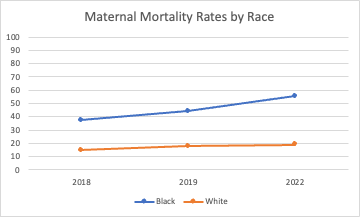
Black women die from pregnancy-related causes more than three times the rate of white women and experience Severe Maternal Morbidity at a rate two times that of white women. One contributing factor is the lack of health insurance
from Medicaid.
Disclaimer: This page is designed for advocates and mobilizers and
contains discussion of harmful themes.

To achieve optimal Black maternal health outcomes in the state of Nebraska, it is essential to further expand meaningful access to affordable and consistent health care for Black birthing folks, wherever they live, throughout their lives – and this legislative win around postpartum expansion under Medicaid has us prepared for greater legislative wins which will contribute positively to Black maternal health in our state.
What is Maternal Mortality and Severe Maternal Morbidity?
According to the U.S. Centers for Disease Control and Prevention, Severe Maternal Morbidity is defined as “unexpected outcomes of labor and delivery that result in significant short- or long-term consequences to the health of a birthing person.”
The CDC categorizes Severe Maternal Morbidity by 21 different adverse events or indicators. These include, but are not limited to, heart failure, hemorrhaging, and renal failure. Although Severe Maternal Morbidity impacts all birthing folks, it disproportionately exacerbates Black women and folks with reproductive systems, which already have the worst maternal health outcomes in Nebraska.
The Severe Maternal Morbidity rate is 63% higher for women in Black communities than in white communities. This is due to the already existing health disparities, such as increased likelihood of chronic illness, access to healthcare, and inadequate care, that are exacerbated during pregnancy. In fact, Black birthing folks are 27% more likely to experience severe pregnancy complications than white birthing folks.
Maternal Mortality is defined as “the death of a woman during pregnancy or within one year of the end of pregnancy.”
Similar to Severe Maternal Morbidity, Maternal Mortality disproportionately affects Black women despite continued progress in medical care and technology. Maternal Mortality rates among Black women continue to increase.

There are many factors resulting in this disparity, including but not limited to structural racism, implicit bias, access to healthcare, and pre-existing chronic conditions.
Nebraska reports of maternal deaths in the state, 3 out of 4 deaths were preventable. Nationally, 1 out of 3 maternal deaths happen from one week to one week to 1 year, and being able to access health is crucial to preventing these deaths.
Resources:
